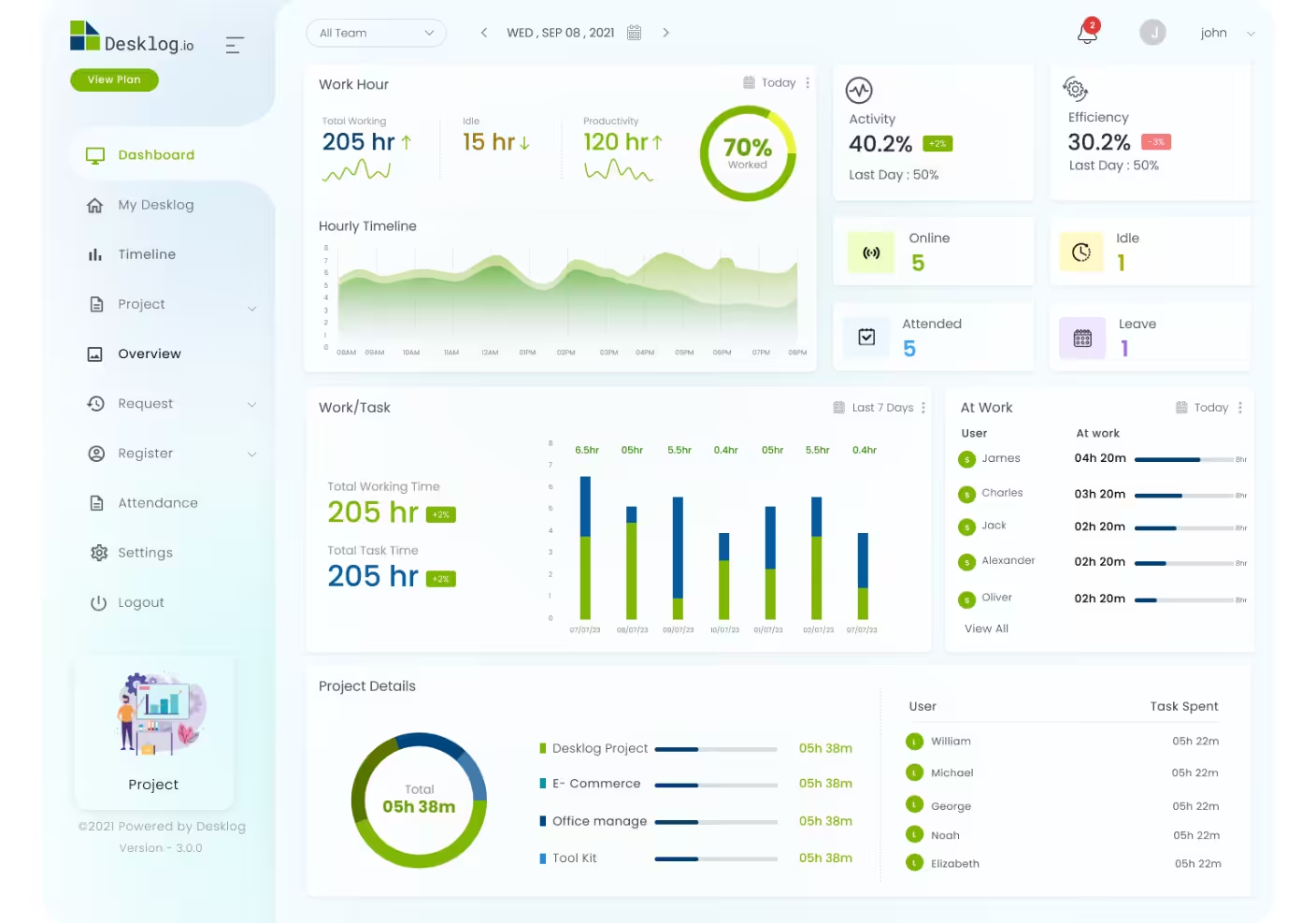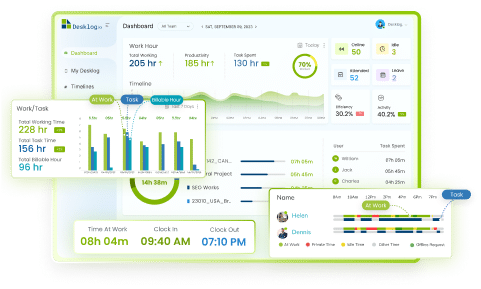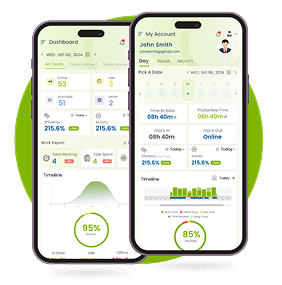
Tips To Effectively Manage Remote Employees
Now due to the current pandemic COVID-19, the environmental circumstance has changed to such an extent that it became mandatory for everyone to stay isolated and work remotely. Yes! It is time to think about the tips to effectively manage remote employees.
But If you have never planned for this situation, it is already late and you need to rush up to set the work policies for remote working employees. It is not that easy to make all employees work remotely instead it involves the exact setup, policies, required tools/platforms, rules to be followed by all the resources of the organization.
To move up with your business productivity, you need to plan the scenarios that include a remote working environment coping with the current operations of the organization to run the business successfully. Using a remote work management software would make this initiative much more easier and meaningful.
It is obvious that you need to support your employees to work remotely with the comfortable platform and rules of the organization. In this article, let us look into the tips on how to effectively manage remote employees.
Tips To Effectively Manage Remote Employees
1. Identify Common Remote Working Challenges
You may come up with so many challenges while managing remote employees. Here we will see the following important challenges.
Lack of Direct Interactions with Employees

When you start with a remote working environment. It is not possible to have direct interactions with employees. It is very crucial to have face to face interaction in order to exchange your views.
The physical reactions of all employees reveal a lot to the managers and this helps them to understand the resources well. At the same time, the resources will be able to understand managers gradually on daily interactions.
The lack of interaction could be faced by remote workers. You need to arrange for proper virtual meetings in order to remove this type of stress involved in the remote work.
Get to know more about Remote Work Monitoring Software
Distractions From Surrounding
Usually, some distractions would be faced by remote working employees. Some people may work at home or some may work from the hotel room depending upon the crisis or any event, etc.
Some distractions like TV sound, a child crying at home, a waiter ringing the bell of the room, etc are some of the surrounding distractions. You need to set the rules and policies for this type of distraction.
Lack of Proper Communication
As we already discussed, there will be a lack of direct interaction so it leads to improper communication via virtual meetings. You need to come up with the perfect project management tool in order to solve this issue.
2. Set the Rules and Policies for Remote Working
Once you identify the challenges involved in the remote working environment, you can set the rules and policies for remote working. Set the productivity standard for all the employees.
Set the working hours so that all the resources need to log in or log out at that particular time. As per the work or the task assigned, an individualized standard time can be set to complete the work.
You can also set the target for a certain team. For example, the sales team needs to make a specific number of sales per month, or the HR recruiter needs to fill the specific number of vacant positions per month.
These targets will help you to find bottlenecks involved in setting productivity standards. Make yourself ready with rules and policies to track the productivity of all employees.
Also read more about work from home vs office
3. Make use of Appropriate Tools to Track the Employees
You must ensure that a perfect remote monitoring tool should be provided to all the employees. To make this happen successfully, the leads and the managers should be held responsible to have work from home environment.
Know How to Choose the Right Employee Time Tracking Software
All the employees should be added to the employee monitoring software or remote-tracking tool and should be provided with login credentials. The managers or the admin can create the credentials for all the employees.
Project management and productivity tracking can be done along with this remote tracking tool. You must ensure that the remote tracking tool which you use for the remote workers will help you with project management, task management, attendance management, productivity tracking with automated features like URL & App tracking, automated screenshot capturing, etc.
Always look for the perfect employee monitoring or remote tracking software to manage the remote employees effectively.
Read more on Remote Work Collaboration and Communication Tool
4. Allocate Specific Time for Team Interaction
Apart from work, you need to introduce casual workplace activities to enhance the teamwork and make it more collaborative even with remote work.
This provides stress release for all the employees and you can allocate some time for this type of team interaction. It may look virtual initially, but try to contact all your remote workers and make them engaged with some remote activities and this energizes their skill and ability to do the remote work more effectively.
5. Do Regular Follow up

To keep your employees engaged and motivated, you need to have a regular follow up with the employees. The effective way is to have one on one call, this makes them more interactive and helps to improve their productivity.
Managers can schedule this one-on-one call, either weekly or monthly and you can get an overall status of the ongoing remote work.
The manager will be able to estimate the following:
Get the List Top Time Management Apps
6. Stick to Company Process and Guidelines
Though it is remote working, the employees need to stick to the guidelines and policies of the organization. This makes both the employer and employee move ahead with the remote working environment. As discussed earlier, we need to identify the challenges and set the comfortable and productive type of guidelines to keep the employees engaged with this type of work.
7. Support with Flexible Working Hours
Flexible working hours are a very important factor for an employee to stay comfortable with your organization. Since distractions are quite common with the remote working, you need to provide a flexible and comfortable environment to stay productive in your business.
For example, an employee may disconnect from the internet connection during his work from home and may take time to connect back to the network. So you cannot be strict on the arrival and departure time. However, you can make use of the productivity tracking software to track the defined productive hours like 8 hours of productive time need to be maintained daily by all the employees.
During the absence of a pandemic, flexible work arrangements can increase recruitment and retention efforts, augment organizational diversity efforts, encourage ethical behavior and help the organization’s efforts to be socially responsible. Employers themselves can experience cost savings, an improved attendance and productivity and thus an increase in the engagement of employees. Hence this also makes the team leads to get remote project management tips in a much improved way.
8. Virtually Connect through Video Chat
Since it is remote working you may not be able to know the physical reactions of the employee via any messenger chat. It is important to have a virtual meeting with all employees via video chat like skype meeting, zoom, etc. and having chat over the topic beyond your business to make personal connections quickly.
9. Analyze the Employee Productivity
The productivity of your employees needs to be gauged in a timely manner for running any profitable business, it doesn’t matter whether you work remotely or from the office directly. Supervisors can easily track when your workforce is operating from just one floor. However, you will need a special employee monitoring tool with features like the automated screenshot, URL tracking, Apps tracking to analyze real-time productivity.
Read blog on Adopt Remote Work & Track Productivity – Prevent COVID19 Crisis
10. Perform Overall Business Review and Support Employees.
Periodic business reviews based on employee productivity and the business achievement will help you stay ahead irrespective of the working model you adopt. Follow this approach more diligently when employees work remotely to assess employee performance and its impact on business. As a supervisor, you need to pass the constructive feedback to the employees and help them to achieve their individual KPI, thus achieving overall business goals.
11. Encourage Communication
Communication between managers and employees always helps engagement. It is always important to listen to what your employees have to say, especially when they are working remotely. The absence of proper communication and a feeling that their concerns are not heard can negatively affect the morale and performance of your employees. It is important for employees to be able to express and process their feelings about work.
12. Do Not Micromanage
You don’t look over your team’s shoulders when they are working from the office. You shouldn’t do it when they’re remote, either. Managers may be worried about losing the visibility they once had into their workers, but micromanaging is not the way to respond. This will negatively affect employee performance and disengage them. It is not advisable to burden remote employees with this additional stress.
Want to try our Time Tracking Software?
Try Desklog for free!

13. Increase Recognition
Employees yearn for recognition more when they are working remotely. Effective recognition not only motivates the employee on the receiving end but also motivates other employees to perform better. Recognition doesn’t always have to be financial. Public acknowledgment, tokens of appreciation, professional growth opportunities, low-cost perks, etc… can all serve as effective motivators.
14. Focus on the Results
Working from the comforts of their own homes allows employees to complete their work in ways that are most comfortable and productive for them. Schedule collaborative activities at commonly agreeable times. Stop obsessing over the process and pay more attention to the results your remote employees produce. Effectively communicate the output you expect from your remote employees and evaluate their performance based on the results.
15. Work Towards Common Goals
Today’s employees prefer learning and skill development over stability. Working for a long time in the same role for the same company is not what most workers desire today. So it has become important to take a personal interest in your remote team’s learning and life goals. Try to connect their interests to the goals of your company to make your employees feel more productive and motivated.

Conclusion
Here in this article, you will be able to know how to effectively manage remote employees. Go through the tips to enhance your business productivity.
Always choose the perfect remote tracking software to monitor the employee working remotely.


